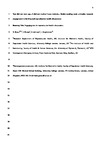You did not turn up… I did not realise I was invited…: understanding male attitudes towards engagement in fertility and reproductive health discussions
| dc.contributor.author | Grace, B | |
| dc.contributor.author | SHAWE, JILL | |
| dc.contributor.author | Johnson, S | |
| dc.contributor.author | Stephenson, J | |
| dc.date.accessioned | 2019-07-04T13:33:43Z | |
| dc.date.available | 2019-07-04T13:33:43Z | |
| dc.date.issued | 2019-06-17 | |
| dc.identifier.issn | 2399-3529 | |
| dc.identifier.issn | 2399-3529 | |
| dc.identifier.other | ARTN hoz013 | |
| dc.identifier.uri | http://hdl.handle.net/10026.1/14600 | |
| dc.description.abstract |
STUDY QUESTION: What are the underlying reasons for low male engagement in fertility and reproductive health discussions and decision-making? SUMMARY ANSWER: The perception of women's primacy in fertility and reproductive health limits the extent to which men believe their engagement is important. WHAT IS KNOWN ALREADY: Active participation of men in the process of informed decision-making regarding childbearing is beneficial for mother, father, and child. However, in research studies in these areas, little attention has been given to men. Additionally, there is poor engagement by men, as well as a dearth of information from, and on, the male perspective. STUDY DESIGN SIZE DURATION: In total, 35 semi-structured telephone and face-to-face interviews were conducted in an office setting with three groups: 13 lay women, 13 lay men, and 9 (2 male and 7 female) healthcare professionals. Interviews took place between October 2016 and February 2017. PARTICIPANTS/MATERIALS SETTING METHODS: Participants were men and women of reproductive age from the general population and healthcare professionals who had completed an online fertility awareness survey and agreed to follow-up interviews. Interviews were audio recorded and lasted ~1 hour, during which participants were asked to provide their views on childbearing decision-making, and male and female representation in fertility and reproductive health. Data was transcribed verbatim and analysed qualitatively via framework analysis. MAIN RESULTS AND THE ROLE OF CHANCE: Both men and women saw fertility as a woman's issue, but from different viewpoints. Women saw it from the perspective of societal stereotypes regarding male and female roles, whereas men tended to defer to the woman's primacy in reproductive decisions. Men generally wanted to be involved in childbearing discussions and improve their fertility knowledge. However, they felt they did not have a voice on the topic because discussions have traditionally focused on women. The notion that men are not expected to be interested and engaged thus becomes a self-fulfilling prophecy. Healthcare professionals agreed that fertility was perceived as the woman's domain, but also highlighted that poor male involvement is typically observed across healthcare needs and is not necessarily unique to fertility and reproductive health. LIMITATIONS REASONS FOR CAUTION: Due to the online recruitment method, there is a potential bias towards respondents of higher, rather than lower, socioeconomic status within the general population. WIDER IMPLICATIONS OF THE FINDINGS: Fertility tends to be seen as a private topic. Additional concerted effort by reproductive health researchers, charity organisations, educators, healthcare service providers, and policy makers is needed to proactively encourage male involvement in reproductive decision-making. This can be achieved through normalising and breaking taboos around the topic, male-friendly research study design approaches, male-inclusive reproductive healthcare services, implementation of health policies that recognise the needs of men, encouraging male research staff representation, and age-appropriate educational programmes on sexual and reproductive health, which include boys and adolescents from a young age. STUDY FUNDING/COMPETING INTERESTS: Research funding was received from SPD Development Co. Ltd. B.G. and S.J. are employed by SPD Development Co. Ltd. None of the other authors have any conflict of interest related to the discussed topic. TRIAL REGISTRATION NUMBER: Not applicable. | |
| dc.format.extent | hoz014- | |
| dc.format.medium | Electronic-eCollection | |
| dc.language | en | |
| dc.language.iso | en | |
| dc.publisher | Oxford University Press | |
| dc.subject | fertility awareness | |
| dc.subject | family building | |
| dc.subject | qualitative research | |
| dc.subject | men's health | |
| dc.subject | preconception health psychosocial issues | |
| dc.subject | reproductive health | |
| dc.subject | fatherhood | |
| dc.subject | childbearing | |
| dc.subject | relationships and sex education | |
| dc.title | You did not turn up… I did not realise I was invited…: understanding male attitudes towards engagement in fertility and reproductive health discussions | |
| dc.type | journal-article | |
| dc.type | Journal Article | |
| plymouth.author-url | https://www.webofscience.com/api/gateway?GWVersion=2&SrcApp=PARTNER_APP&SrcAuth=LinksAMR&KeyUT=WOS:000661875900006&DestLinkType=FullRecord&DestApp=ALL_WOS&UsrCustomerID=11bb513d99f797142bcfeffcc58ea008 | |
| plymouth.issue | 3 | |
| plymouth.volume | 2019 | |
| plymouth.publication-status | Published | |
| plymouth.journal | Human Reproduction Open | |
| dc.identifier.doi | 10.1093/hropen/hoz014 | |
| plymouth.organisational-group | /Plymouth | |
| plymouth.organisational-group | /Plymouth/Faculty of Health | |
| plymouth.organisational-group | /Plymouth/Faculty of Health/School of Nursing and Midwifery | |
| plymouth.organisational-group | /Plymouth/REF 2021 Researchers by UoA | |
| plymouth.organisational-group | /Plymouth/REF 2021 Researchers by UoA/UoA03 Allied Health Professions, Dentistry, Nursing and Pharmacy | |
| plymouth.organisational-group | /Plymouth/Research Groups | |
| plymouth.organisational-group | /Plymouth/Research Groups/Institute of Health and Community | |
| plymouth.organisational-group | /Plymouth/Research Groups/Plymouth Institute of Health and Care Research (PIHR) | |
| plymouth.organisational-group | /Plymouth/Users by role | |
| plymouth.organisational-group | /Plymouth/Users by role/Academics | |
| dc.publisher.place | England | |
| dcterms.dateAccepted | 2019-04-22 | |
| dc.rights.embargodate | 2019-11-27 | |
| dc.identifier.eissn | 2399-3529 | |
| dc.rights.embargoperiod | Not known | |
| rioxxterms.versionofrecord | 10.1093/hropen/hoz014 | |
| rioxxterms.licenseref.uri | http://www.rioxx.net/licenses/all-rights-reserved | |
| rioxxterms.licenseref.startdate | 2019-06-17 | |
| rioxxterms.type | Journal Article/Review |


